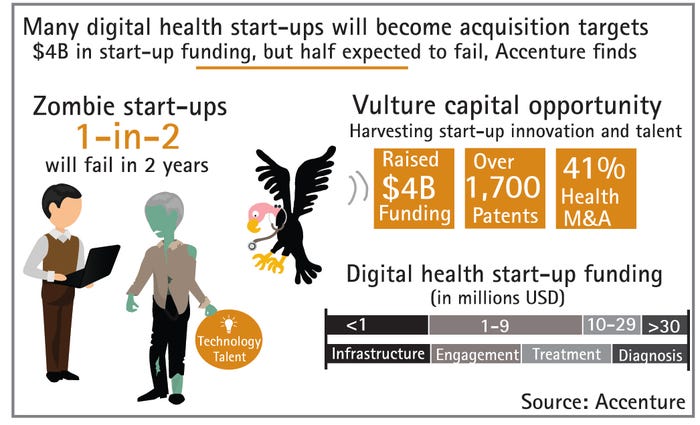Is Digital Health Kind of Like a Zombie Flick?
August 14, 2015
Surviving is a coin toss, and others may want to devour your brains.
Chris Newmarker
|
Despite the boom in digital health funding, there is only a 50/50 chance a given digital health venture will be around two years after launch. Image courtesy of Accenture. |
One out of every two digital health startups will likely fail within two years of launch--but other companies may want to feast on the talent and intellectual property leftover from such "zombie" companies, according to a new report from Accenture.
The report will likely provide some food for thought in a sector has yet to prove experts right when it comes to reaching the "peak of inflated expectation" in the Gartner hype cycle. Prepare for even more chomping and brain slurping sounds if digital health ever goes over that peak.
In fact, Accenture's analysis of 900 healthcare IT startups found that 51% are in danger of failing within 20 months of their launch. The "zombie" startups received $4 billion in startup funding between 2008 and 2013.
Don't think the $4 billion just disappeared, though. Accenture argues that there are plenty of reasons for a healthcare player to acquire a failing healthcare IT startup, including talented tech workers and intellectual property (1700 patents among the 900 companies Accenture analyzed).
"Rather than discard the investment that has been made in getting sputtering startups off the ground, it often makes sense for healthcare stakeholders to acquire them, salvage their best people and technologies and awaken them from a zombie-like existence," Kaveh Safavi, managing director for Accenture's global healthcare business, said in a news release. "Many digital startups that are dying or in danger of failure have developed solutions that can help traditional and nontraditional healthcare companies achieve their goals.'
For now, funding for digital health companies isn't slowing down. Such companies brought in $2.1 billion in funding during the first half of 2015, just short of what they received during the first half of 2014, according to Rock Health.
Accenture estimates that another $2.5 billion go into health technology startups over the next two years. Investment will focus on the key segments of engagement (25%), treatment (25%), diagnosis (21%), and infrastructure (29%).
"In a period of disruption, leading organizations understand that they cannot keep doing the same things and expect to succeed," Safavi said. "They must become disruptors instead of being disrupted. Acquiring a failing health IT startup with excellent people and promising intellectual capital could be just the prescription for achieving that goal."
Refresh your medical device industry knowledge at MEDevice San Diego, September 1-2, 2015. |
Chris Newmarker is senior editor of Qmed and MPMN. Follow him on Twitter at @newmarker.
About the Author(s)
You May Also Like



